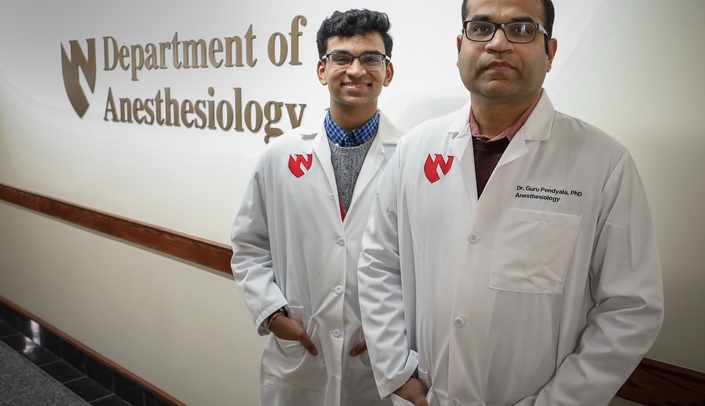Gurudutt Pendyala, Ph.D., had something of a “proud-parent” moment recently when his volunteer student researcher and mentee, Rahul Guda, was accepted into Harvard University.
Guda, currently a senior at Milliard North High School, will attend Harvard University in the Fall of 2019 and pursue a concentration in Neurobiology with a minor in Global Health and Health Policy. Guda hopes to eventually obtain both M.D. and Ph.D. credentials. He was one of 935 students selected from a pool of 6,958 applicants in Harvard College’s early action program. In recent years, Harvard received roughly 40,000 applications annually and accepted approximately 5% of those students.
“Rahul is an exceptional student,” said Chairman Steven J. Lisco, M.D. “This accomplishment is not only a testament to Rahul’s talent, but also to Dr. Pendyala’s mentorship. We’re proud to have hosted Rahul as a volunteer student researcher in our department.”
This mentorship began when Guda, whose parents are both researchers at UNMC, approached Dr. Pendyala in September 2017 because of his research in neuroscience which focuses on understanding the impact of drugs of abuse, especially opioids, on overall brain function and development.
Guda expects Dr. Pendyala’s mentorship to give him a head start in undergraduate research at Harvard. Because of his time in Pendyala Lab, Guda has a foundational knowledge of laboratory protocols, skills and techniques not available to all high school students.
“Dr. Pendyala was crucial to me achieving my goal of getting into Harvard,” said Guda. “His willingness to trust me to take on a real research project of my own is extremely rare among professors, and I am extremely grateful for having that opportunity.
“He is extremely passionate and spreads that attitude toward everyone he works with. Each day in the lab brought me a new adventure, and Dr. Pendyala is to thank for that.”
Last summer, Guda completed UNMC’s Travis B. Lewis Fellowship, working 40 hours a week for 10 weeks in the Department of Pharmacology and Experimental Neuroscience. During that time, he completed critical experiments and authored the publication titled, "Brain-derived extracellular vesicle microRNA signatures associated with in utero and postnatal oxycodone exposure: Implications for altered synaptogenesis."
Throughout his high school career, Guda earned awards at a state and national level for his performance in academics, science and speech. He hopes to use his talents in science and public speaking to create a research culture that values its inherent humanity as much as the scientific insight that it produces.
Pendyala Lab Student Volunteer Accepted into Harvard University
- Written by Danielle Beebe
- Published Feb 11, 2019
